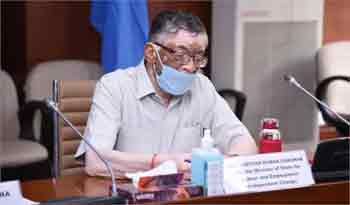 INVC NEWS
INVC NEWS
New Delhi,
Union Minister of State for Labour & Employment (Independent Charge) Shri Santosh Gangwar has said that India is committed to improve employment outcomes for all youth in India, including women and vulnerable section of the people, through an enduring, long-term commitment for better opportunities. He said, the Government is making all-out efforts to improve the bridge between education and employment, and to prepare young people for the future of work. A number of policies and schemes have been undertaken for upliftment of the youth through skills development, employment generation, and entrepreneurship programs.
Speaking after the signing of Statement of Intent between the Ministry of Labour and Employment and UNICEF here today, the minister said, by leveraging the strengths of the Ministry, UNICEF and associated network members, we hope to enable abundant choices for our young generation to contribute and shape our country’s future. Appreciating the idea of partnership between the Ministry and UNICEF for empowering our youths to gain relevant skills and guidance, Shri Gangwar said, the collaboration is a starting point to facilitate direct dialogue and feedback mechanism between youth and other stakeholders including policy makers.
Shri Gangwar said, India is a country of young people. According to Census 2011, every fifth person in India is a youth (15-24 years). He said, the National Career Service (NCS), launched in 2015, caters to the employment and career needs of the youth. It provides a variety of employment related services like career counseling, vocational guidance, information on skill development courses, apprenticeship, internships etc.
The Minister informed that NCS has taken a number of initiatives to mitigate the challenges in the labour market due to COVID-19 and the consequent lockdown of the economy. Online Job Fairs are being organized to bridge the gap between job seekers and employers where the complete cycle from job posting to selection of candidate can be completed on the portal. A Special link for Work from Home Jobs and Online Trainings has been created on NCS portal to give direct access to job-seekers to such jobs. All these facilities on NCS are free of cost.
Shri Gangwar expressed hope that in the next three years, both UNICEF and Ministry of Labour & Employment will make great achievement in the areas of collaboration and empowerment of Indian youth to face the future confidently.
Secretary (Labour & Employment), Shri Apurva Chandra, Special Secretary (Labour & Employment) and DGE, Ms Anuradha Prasad, Country Representative of UNICEF, Dr Yasmin Ali Haque, and senior officers from the Ministry and UNICEF India were present on the occasion.
Driven by its mission to deliver results for children, UNICEF has come together with its public and private sector partners to establish the YuWaah, Generation Unlimited (in short GenU) as a partnership in India. GenU is a global multi-stakeholder platform that aims to prepare young people to transition to productive work and active citizenship. In India, by 2030 YuWaah aims to ensure, the following, namely: – (a) Build pathways for 100 million young people to aspirational economic opportunities; (b) Facilitate 200 million young people to gain relevant skills for productive lives and the future of work; and (c) Partner with 300 million young people as changemakers and create spaces for developing their leadership.
The Statement of Intent intends to provide a platform for cooperation between MoLE and UNICEF to leverage the existing mainstreamed initiatives of both parties in select states to co-create and implement solutions at scale to tackle the employment and skilling challenges for adolescents and youth in India, with focus on vulnerable population including young people with special needs, youth leaving care institutions, migrant youth, victims of child labour, violence, child marriage and trafficking and like other matter. Areas of collaboration include: 1. Create linkages with aspirational economic opportunities, that is, connecting young people with employment opportunities, including building pathways to connect them with jobs, self-employment, entrepreneurship, apprenticeships and internships. For this, innovative solutions and technology platforms will be engaged to maximize the scale and reach. 2. Upskilling of young people on 21stcentury skills including life skills, financial skills, digital skills, vocations skills and foundational skills through online and offline channels and support them through self-learning, for their productive lives and the future of work. 3. Strengthening National Career Service (NCS) by forming a coalition of partners to engage on the following areas: (a) Promotion of NCS among job seekers and employers through YuWaah networks. (b)Integration of career guidance sessions or videos, or both by successful entrepreneurs and professionals. (c)Updating Career Information on NCS Portal related to sectors and job roles. (d)Integration of E-learning courses for job readiness of young people. (e)Exploring value additions for Model Career Centers and Employment Exchanges like: D2X (Direct to Employment Exchange) classes on job readiness. (f)Integration with NCS portal for connecting with jobseekers. MoLE may provide the necessary API interfaces to the YuWaah to connect with the job seekers. MoLE may facilitate the necessary integration and exchange of data base of candidates under the various categories of NCS Portal with the Partner Institution (YuWaah). (g)Career Counselling and Vocational Guidance, that is to say that the Network of Career Counsellors and Model Career Centres are integral component of the NCS. Qualified counselors are empaneled with NCS and over 200 Model Career Centres have been established to provide the Career Counselling, Vocational Guidance, Skill Gap Analysis, organizing Job Fairs and like other matters (h)Identifying solutions for assessing jobseekers registered on NCS portal, for better job-matching 4. Support in Job forecasting by exploring the gaps in job forecasting and work towards predicting which sectors or /jobs, or both of the economy are strengthening or weakening to build linkages to focus needs for skilling. 5. Supporting direct dialogue and the establishment of a feedback mechanism between youth and policy stakeholders towards ensuring that schemes and programmes are consistent with young people’s priorities and aspirations (via the online Ureport and youth-led multi-stakeholder consultations).














